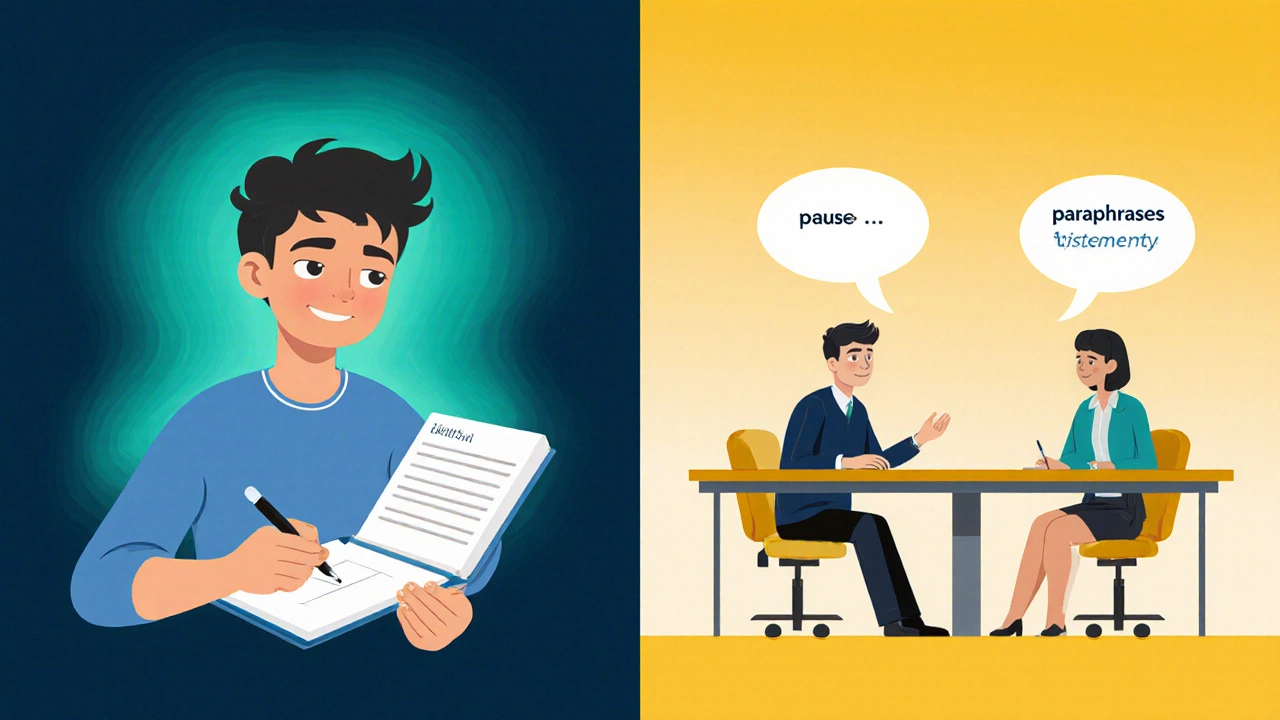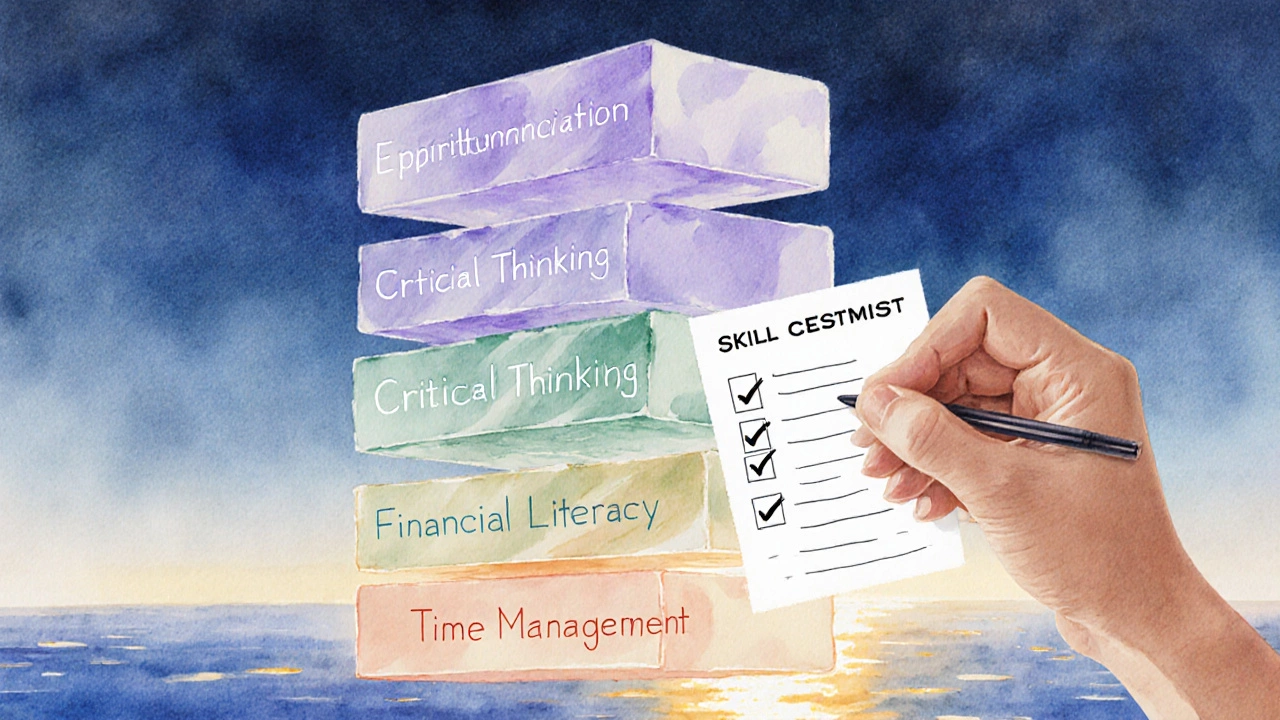Ever wondered which abilities will actually move the needle in your personal and professional life? The answer isn’t a fancy certification or a trendy hobby - it’s a set of core life skills that every adult can learn and apply daily.
Key Takeaways
- Focus on transferable skills like critical thinking, emotional intelligence, and financial literacy.
- Combine practice with real‑world feedback to accelerate improvement.
- Use the provided checklist to track progress and stay accountable.
- Avoid common traps such as over‑learning theory without action.
- Apply the “skill‑stack” approach: pair complementary skills for maximum impact.
What Exactly Are Life Skills?
Life Skills are a collection of abilities that help individuals navigate daily challenges, make informed decisions, and build meaningful relationships. They span both soft aspects - like communication - and hard components - like budgeting - but all share the goal of boosting personal effectiveness.
Why They Matter for Adults
Unlike school‑age learning, adult life skills directly affect income, health, and happiness. A 2023 OECD report linked higher emotional intelligence to a 12% wage premium, while strong financial literacy cuts debt by an average of €3,200 per household. In short, mastering these abilities translates to tangible benefits.
How to Choose the Right Skills for You
- Identify gaps in your current routine - do you struggle with budgeting or speaking up in meetings?
- Prioritise skills that align with your short‑term goals (e.g., landing a promotion) and long‑term vision (e.g., financial independence).
- Consider the “skill‑stack” effect: pairing complementary abilities amplifies results.

Essential Life Skills and How to Build Them
Critical Thinking
Critical Thinking is the disciplined process of evaluating information, identifying biases, and drawing logical conclusions. It uses evidence, questions assumptions, and enables better problem solving.
Start by tackling one puzzle a week - a brain‑teaser, a news article, or a work case study. Ask yourself: What evidence supports this claim? What alternative explanations exist?
Emotional Intelligence
Emotional Intelligence (EI) refers to the ability to recognise, understand, and manage your own emotions and those of others. High EI improves teamwork, reduces stress, and boosts leadership potential.
Practice by keeping a brief emotion journal. Note triggers, physical sensations, and reactions. Over time, you’ll spot patterns and learn to reframe negative responses.
Financial Literacy
Financial Literacy means understanding how money works - budgeting, saving, investing, and debt management. It empowers you to make choices that grow wealth rather than erode it.
Begin with the 50/30/20 rule: allocate 50% of income to essentials, 30% to lifestyle, and 20% to savings or debt repayment. Use a free budgeting app to track every expense for one month.
Effective Communication
Effective Communication combines clear language, active listening, and appropriate body language. It reduces misunderstandings and builds trust.
Try the “pause‑paraphrase” technique in meetings: pause before responding, then restate the speaker’s point in your own words. This shows you’re listening and often uncovers hidden assumptions.
Time Management
Time Management is the discipline of planning and exercising conscious control over the amount of time spent on specific activities, aiming to increase efficiency.
The Pomodoro method works well for many adults: 25 minutes focused work, followed by a 5‑minute break. After four cycles, take a longer 15‑minute recharge.
Problem Solving
Problem Solving involves identifying an issue, generating alternatives, evaluating options, and implementing a solution. It leverages creativity and logical analysis.
Adopt the “5 Whys” approach: ask “why?” five times to drill down to the root cause of a problem before jumping to fixes.
Resilience
Resilience is the capacity to bounce back from setbacks, adapt, and keep moving forward. It protects mental health and sustains long‑term performance.
Build resilience by setting micro‑goals after a failure. Celebrate each small win - it rewires the brain to associate setbacks with recovery rather than defeat.
Comparison: Soft Skills vs Hard Skills
| Aspect | Soft Skills | Hard Skills |
|---|---|---|
| Typical Examples | Communication, empathy, adaptability | Excel, coding, project budgeting |
| Measurement | Peer feedback, behavioural assessments | Certifications, test scores |
| Transferability | Highly transferable across industries | Often industry‑specific |
| Learning Curve | Requires practice & reflection | Often linear, can be taught via courses |
Practical Checklist: Mastering the Top Life Skills
- Choose one skill to focus on each month.
- Set a SMART goal (Specific, Measurable, Achievable, Relevant, Time‑bound).
- Find a real‑world context - apply the skill at work, at home, or in a community group.
- Seek feedback after each application; adjust your approach.
- Document progress in a dedicated journal or digital tracker.

Common Pitfalls and How to Avoid Them
Over‑theorising: Reading endless articles without practice stalls growth. Counteract by pairing each learning session with a concrete action.
Waiting for perfection: Perfectionism leads to paralysis. Adopt a “minimum viable practice” mindset - do enough to learn, then iterate.
Neglecting reflection: Without a pause to evaluate outcomes, you repeat the same mistakes. Schedule a 10‑minute debrief after each skill‑use episode.
Next Steps: Building Your Skill Stack
Start with the skill that will unblock the most immediate goal. If you aim for a promotion, pair Effective Communication with Critical Thinking. If financial security is the priority, blend Financial Literacy with Resilience to stay the course during market dips.
Remember, life‑skill mastery is a marathon, not a sprint. Keep the momentum by revisiting the checklist monthly, celebrating milestones, and adjusting your stack as your life evolves.
Frequently Asked Questions
How long does it take to become proficient in a life skill?
Proficiency varies by skill and effort. Research on deliberate practice suggests roughly 20 hours of focused, feedback‑driven activity can move you from novice to competent for most soft skills. Hard skills often require 40‑80 hours, especially if certification is involved.
Can I learn these skills online, or do I need in‑person classes?
Both work, but a blended approach tends to yield the best results. Online courses provide theory; real‑world practice, mentorship, or peer groups supply feedback, which is crucial for soft skills like emotional intelligence.
How do I measure improvement in soft skills?
Use 360‑degree feedback, self‑assessment scales, and observable outcomes (e.g., fewer conflicts, higher meeting participation). Track changes over time in a simple spreadsheet to see trends.
Is it ever too late to start developing these skills?
Never. Neuroplasticity studies show adults retain the ability to form new neural pathways well into later life. Consistent practice, even in small daily increments, can lead to measurable gains at any age.
Should I focus on one skill at a time or learn several simultaneously?
Start with one primary skill to build momentum, then add complementary ones. For example, after boosting time‑management, pair it with problem‑solving to handle complex projects more efficiently.






